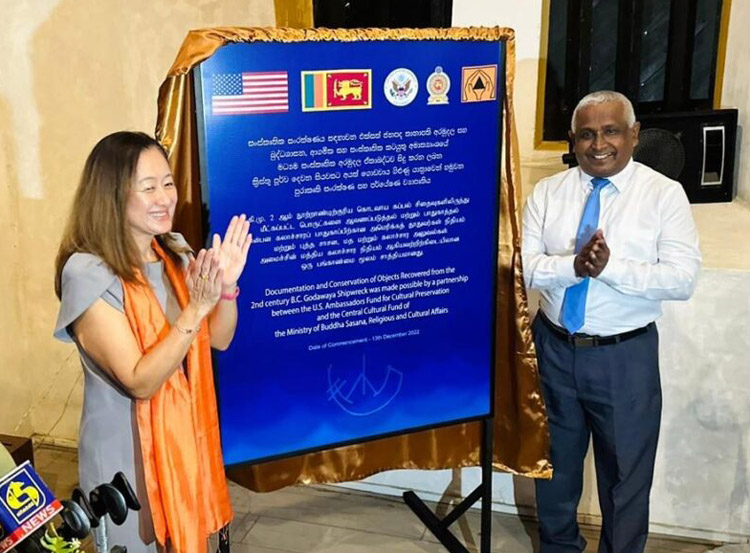The Preservation of South Asia’s Oldest Shipwreck is Funded by U.S.
Summary
U.S. Ambassador Julie Chung, Secretary to the Ministry of Buddhasasana, Religious and Cultural Affairs Somaratne Vidanapathirana, Director General of Central Cultural Fund Professor Gamini Ranasinghe, and Senior Archaeology Officer Rasika Muthucumarana commemorated the announcement of a U.S. grant of $82,192 […]

U.S. Ambassador Julie Chung, Secretary to the Ministry of Buddhasasana, Religious and Cultural Affairs Somaratne Vidanapathirana, Director General of Central Cultural Fund Professor Gamini Ranasinghe, and Senior Archaeology Officer Rasika Muthucumarana commemorated the announcement of a U.S. grant of $82,192 to document and preserve the Godawaya shipwreck and its artifacts.
The grant to Sri Lanka’s Central Cultural Fund comes from the U.S. Ambassadors Fund for Cultural Preservation.
Ambassador Chung, at the ceremony inside the Maritime Archeological Museum inside the Dutch Fort, stated, “By recording the significant role that Sri Lanka has played as a centre for the Indo-Pacific region’s travellers and traders from its former days, the United States hopes to help conserve and promote Sri Lanka’s splendid cultural heritage.”
The Godawaya, originally found by two Sri Lankan divers, is the oldest known shipwreck in the Asia-Pacific region and one of the oldest sunken vessels to be uncovered in the world. Situated next to the Hambantota Port, it consists of a heap of eroded metal bars and a disperse of other historic cargo, including glass ingots and pottery.
The documentation and preservation funded through the grant will be handled by the Central Cultural Fund’s Maritime Archeology Unit. Documentation of the site and engagement with U.S. experts on Indo-Pacific trade routes and shipwrecks will expand worldwide understanding of trade in the Indo-Pacific and particularly Sri Lanka’s role in this wealthy history. The documentation of the globally recognized location and conservation of objects already exposed on the seabed floor will be shared with Sri Lankan scholars and secondary and university-aged students by the Maritime Archeology Unit’s Galle and Colombo lab. Once the project has been finished, artifacts will also be on show to the public in the Maritime Archeological Museum in Galle.
Since 2001, the U.S. Ambassadors Fund for Cultural Preservation has financed 15 projects in Sri Lanka, amounting to the assistance of $1, 387, 294. These consist of a recording of the Western monasteries at the World Heritage Site of Anuradhapura, the preservation of the Rajagala Buddhist jungle monastery, the conservation of Buddhist, Hindu, and other selections in the Anuradhapura Archaeological Museum, the restoration of the Batticaloa Dutch Fort, the conservation of the ritual music and dance forms of the Adivasi, Tamil, and Buddhist communities and the preservation of a 17th century Kandyan Kings’ Palace in Kandy.